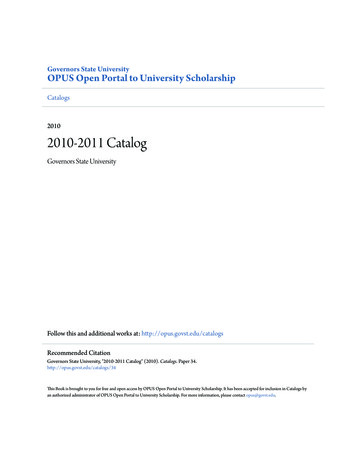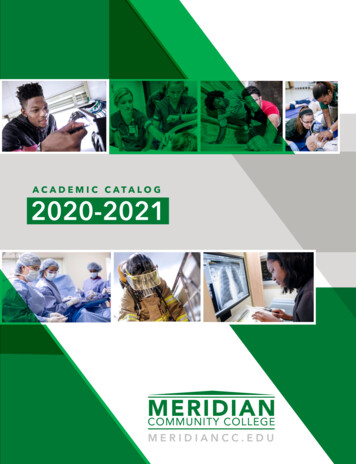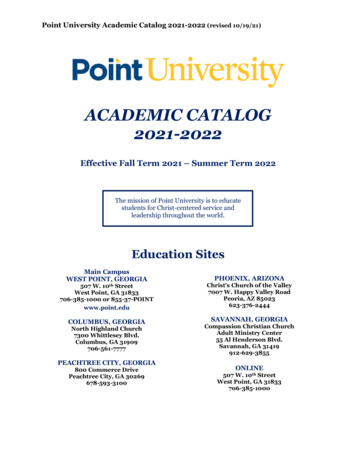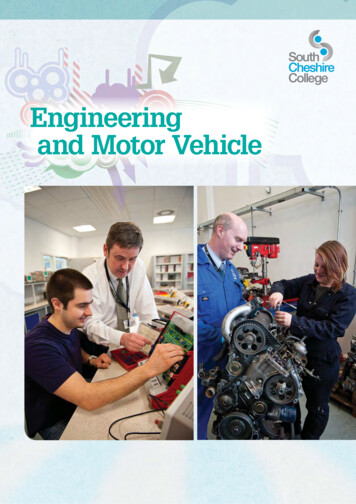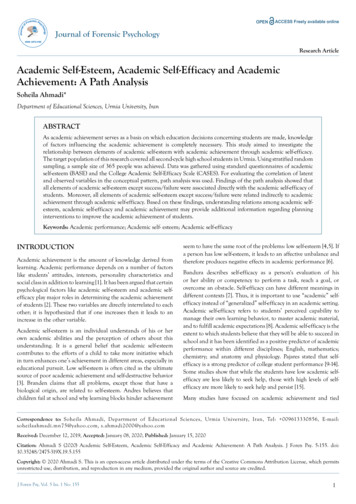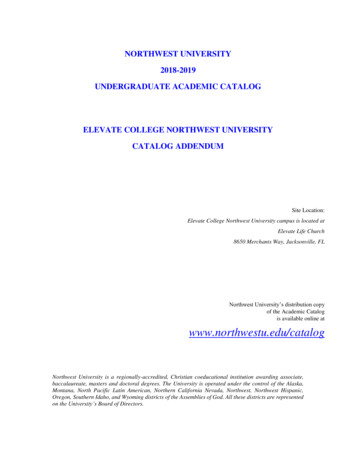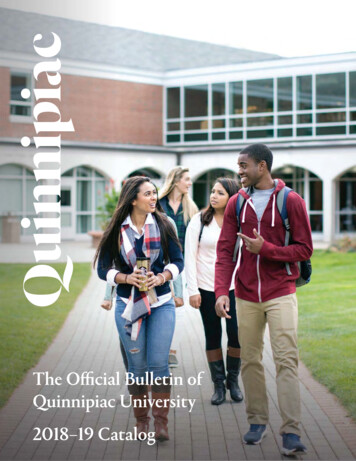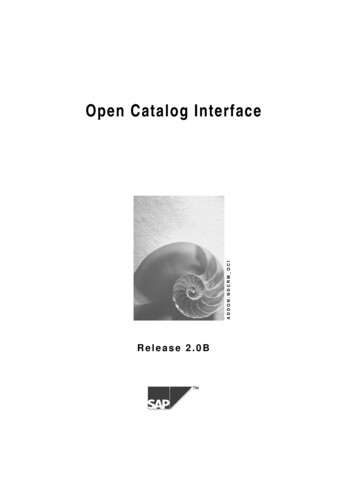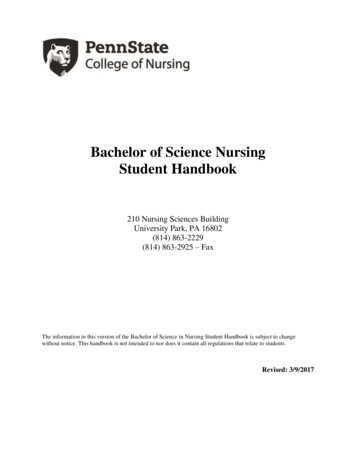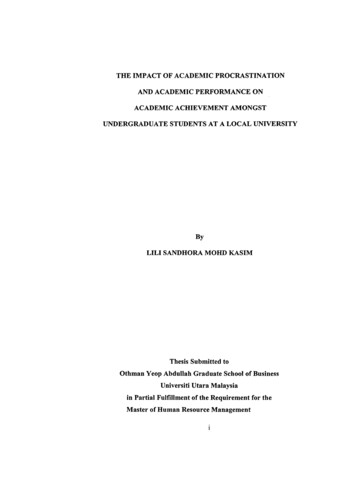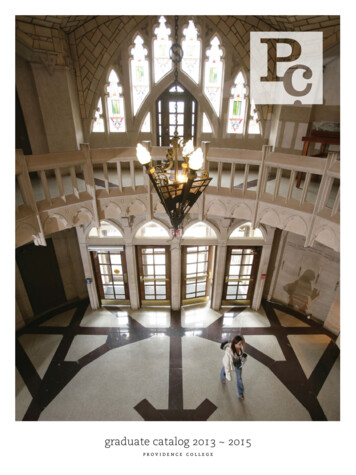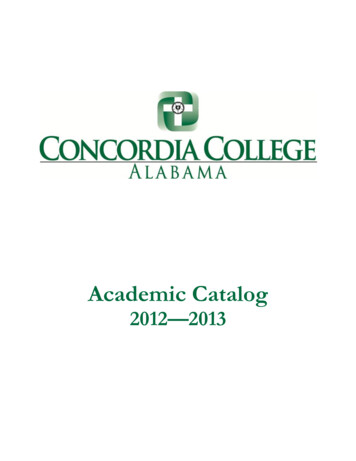
Transcription
Academic Catalog2012—2013
CONCORDIA COLLEGESelma, AlabamaAcademic Catalog 2012-2013Concordia College1712 Broad StreetSelma, Alabama 36701(334) 874-5700LICENSUREConcordia College is licensed and approved by the State Department of Education under Title16-46-1 through 10, Code of Alabama, Act No. 80-272.ACCREDITATIONConcordia College is accredited by the Commission on Colleges of the Southern Association ofColleges and Schools (1866 Southern Lane, Decatur, Georgia 30033-4097; Telephone number404-679-4501) to award the Associate of Arts degree and the Bachelor of Science degree.CHANGESThe contents of this Catalog represent the most current information available at the time ofpublication. However, during the period of time covered by this Catalog, the College reservesthe right to make necessary changes with respect to this information without prior notice.Students can be provided with information on changes by contacting the Office of the VicePresident for Academic Affairs.STATEMENT OF EQUAL OPPORTUNITYConcordia College operates in compliance with all requirements imposed by or pursuant to TitleVI of the Civil Rights Act of 1964 and the regulations issued there under to the end that noperson in the United States shall, on the ground of race, color, or national origin, be excludedfrom participation in, be denied the benefits of, or be otherwise subjected to discriminationunder any program or activity sponsored by this institution. For further information, contact theVice President for Academic Affairs.Concordia College complies with the provisions of the Family Educational and Privacy Act of1974 (HEW Rules and Regulations, Title 45, Section A, Part 99 of Section 438 of Federal Law 93380, Buckley Amendment).Concordia College is committed to providing equal educational opportunities for individualswith disabilities in compliance with Section 504 of the Rehabilitation Act of 1973 and theAmericans with Disabilities Act of 1990.Requests for reasonable accommodations should be directed to the 504 Coordinator 334-8745700.1
TABLE OF CONTENTSPageGENERAL INFORMATIONA History of Concordia CollegePresidents of Concordia CollegeThe Concordia University SystemOur Mission & VisionInstitutional GoalsCampus MapLocation, Buildings, & Facilities4556689FINANCIAL INFORMATIONTuition & FeesMethods & PaymentsRefundsStudent Financial Aid ProgramScholarshipsGrants & Employment OpportunitiesSatisfactory Academic Progress (SAP)SAP Minimum StandardsSatisfactory Course CompletionTransfers & Change of MajorsFinancial Aid TerminationAppeal ProcessSAP ProbationReinstatement of Financial AidSAP & Conduct for Veterans BenefitsStatement of Registration N REGULATIONSAdmission ProceduresAdmission RequirementsReadmission ProceduresReadmission after Academic SuspensionReadmission after Disciplinary SuspensionAthletic SuspensionRegistration24242627272828ACADEMIC INFORMATION & REGULATIONSStudent RecordsClassification of StudentsClass Attendance PolicyGrading Policies & ProceduresMajor29303031322
PageAn Area of Concentration or EmphasisSatisfactory Academic Progress & PerformanceSatisfactory Academic Progress & Performance ScheduleAcademic Warning, Probation, & SuspensionAcademic Bankruptcy or “Forgiveness” PolicyClass SizeWithdrawal from a CourseWithdrawal from the InstitutionAdministrative WithdrawalFinal ExaminationsEvaluation of CreditsAcademic HonorsAcademic RecordsDegrees OfferedGeneral Education RequirementsApplication for GraduationGraduation RequirementsAssociate of Arts DegreesBachelor of Science in Business Administration DegreeBachelor of Science in Education RSE DESCRIPTIONS53FACULTY & STAFF LISTINGS803
GENERAL INFORMATIONA History of Concordia CollegeConcordia College has grown much from its humble beginnings in 1922 as Alabama LutherCollege. Today, Concordia boasts a student body representing a diversity of geographic, ethnic,and socioeconomic backgrounds, as well as the distinctive status as the nation’s only LutheranHistorically Black College or University (HBCU).Concordia’s beginning has its root in the desire of a woman named Rosa Young to provide goodChristian education to the rural African Americans of central Alabama. Through her tirelessefforts, her school in Wilcox County which began with seven students had grown to 215 in justthree terms. In 1914, however, the Mexican boll weevil devastated the cotton industry andeconomy in the area, and many of the parents were then unable to continue sending theirchildren to Young’s school. In desperation to find financial help, Rosa Young wrote to thefamed founder of the Tuskegee Institute, Booker T. Washington. About their correspondence,Rosa Young said, “In this letter he told me he was unable to help me in the least; but he wouldadvise me to write to the Board of Colored Missions of the Lutheran Church. He said they weredoing more for the colored race than any other denomination he knew of. He liked thembecause of the religious training which they were giving the colored people.” By the end of1915, Young had followed Washington’s advice and written to the Lutheran SynodicalConference of North America for help.The Lutheran Church—Missouri Synod, a member of the Lutheran Synodical Conference,responded favorably to Young’s letter and sent the Rev. Nils J. Bakke to assess the situation andreport back. Reverend Bakke arrived on December 17, 1915 and on December 21, he returnedto St. Louis, MO with his report. Bakke’s report was a plea for assistance in establishing amission to the area. In January 1916, Bakke returned to Alabama, and by Easter 1916, hadperformed a total of 61 baptisms and 70 confirmations in Rosebud, including that of RosaYoung herself. Within just a few years there were almost 30 new congregations, and planswere begun for a school. A conference held in Midway, near Miller’s Ferry in 1919 adopted aresolution petitioning the Synodical Conference for funds to begin a school for the purpose oftraining church workers. On November 13, 1922, in a rented cottage at 521 First Avenue, thefirst classes of Rosa Young’s new school were held in Selma. As the student body continued togrow, the need for space became more pressing. On September 20, 1925, the first buildings onthe present campus were dedicated to the glory of God. The next year, four women made upthe school’s first graduating class.Under God’s watchful eye, Alabama Luther College survived the Great Depression, but it hadlost its college and been renamed Alabama Lutheran Academy. It was not long though beforethe necessity of bringing a college education to African Americans was again realized, and aprogram of modernization was initiated which resulted in the formation of Alabama LutheranAcademy and College. On July 1, 1981, the name of the Alabama Lutheran Academy andCollege was officially changed to Concordia College. Two years later, Concordia received4
accreditation as an associate-degree granting institution by the Southern Association ofColleges and Schools (SACS). In 1994, SACS granted Concordia accreditation as a baccalaureatedegree granting institution. Concordia continued to grow as a four-year institution, and in 2010acquired the property of the United Methodist Children’s Home, and expanded the size of thecampus from 22 acres to 57, as well as adding additional housing and historic buildings.In her valedictorian speech during her graduation from Payne University in 1909, Rosa Youngstressed the obligation of service when she wrote, “‘He that is greatest among you shall be yourservant,’ is the language of the Great Teacher. To serve is regarded as a divine privilege as wellas a duty by every right-minded man.” Today, Concordia continues in those words as it seeks toprepare students through Christ-centered education for lives of responsible service to thechurch, community, and the world.Presidents of Concordia CollegeRev. Robert O. L. LynnRev. Edward A. Westcott, Sr.Rev. Dr. Walter EllwangerProf. Varnes J. StringerRev. Dr. Paul ElbrechtRev. Dr. Peter R. HuntDr. Willis L. WrightRev. Dr. Julius JenkinsRev. Dr. McNair RamseyRev. Dr. Tilahun M. Mendedo1922-19321934-19451945-19631964-1966 (Acting President)1966-19701970-1971 (Acting President)1971-19801980-20072007-2010 (Interim President)2010-presentThe Concordia University SystemConcordia College is one of ten colleges and universities of the Concordia University System(CUS) of the Lutheran Church—Missouri Synod. The colleges and universities of CUS arededicated to the Gospel of Jesus Christ and to preparing students for lives of meaning andservice. They provide a Christ-centered environment for students to develop in value-basedcommunities of learning.Concordia University, Ann Arbor, MichiganConcordia University, Austin, TexasConcordia College, Bronxville, New YorkConcordia University, Chicago, IllinoisConcordia University, Irvine, CaliforniaConcordia University, Mequon, WisconsinConcordia University, Portland, OregonConcordia University, Saint Paul, MinnesotaConcordia College, Selma, AlabamaConcordia University, Seward, Nebraska5
Our Mission & VisionConcordia College prepares students through a Christ-centered education for lives ofresponsible service in the church, the community and the world.Concordia College will be a diverse, global institution of excellence, and a leader in developingintellectual, spiritual and moral leaders of Christ-centered justice.Concordia is committed to the premise that a Christian education is essential for the totaldevelopment of the potential of each individual and that instruction must begin at thestudent’s level of skills and ability. Therefore, the Christian faith is reflected in its academicprograms and services, both developmental and regular college level, as well as in its studentlife services and activities.All disciplines in the traditional liberal arts curriculum provide the conceptual frameworknecessary for analysis and problem solving in society while the fine arts enlighten and enrichthe human spirit. Our academic programs are supported by the latest technology and learningresources. Concordia's faculty is sensitive and responsive to the academic needs of eachstudent and the college is committed to educating students for responsible and effectiveservice to God and fellowman.Concordia fosters a community in which the Christian values of group living are emphasized.The college provides special activities and programs that promote the development of socialconcern and sensitivity toward the dignity and worth of each individual. These activities andprograms help students acquire attitudes and skills essential for self-understanding, leadership,and cooperation with others. Our Christian campus atmosphere is also supported by suchactivities as chapel worship, Bible study, dormitory devotions, intercollegiate and intramuralathletics, and participation in various organizations and clubs.Institutional Goals1. To provide an environment which helps students grow in Christian faith;2. To evaluate, develop, and improve the administrative structure and operatingprocedures and tools of the college;3. To provide an environment which fosters creativity, inquiry and critical thinking;4. To provide effective learning experiences for students with differing needs, abilities,interests, goals, and ages so that they may receive both a general education as well asspecific, in-depth knowledge in a chosen area of study;6
5. To provide an opportunity for total student development through a program of studentsupport services designed to complement the academic program by creating andmaintaining a spiritual, cultural and social environment conducive to student life;6. To continue to improve the quality of education by providing instructional and learningresources, support and facilities that strengthen academic programs and promote anenvironment conducive to the development of competence in personnel and pride inthe institution7. To provide both associate and baccalaureate programs which prepare students forfurther study or the job market;8. To provide programs, activities and services (credit and non-credit courses) designed tomeet the needs of constituent communities;9. To continue to advance the institution through improved public relations, increasedenrollment, and increased support from alumni, corporations, foundations, governmentand friends; and10. To maintain a system of planning, budgeting, and evaluation designed to improve theefficiency and effectiveness in the utilization of available resources7
8
LocationConcordia College is located on a 57-acre site in the northeastern section of Selma,approximately four blocks from Highway 80. Selma, the county seat of Dallas County, is about50 miles west of Montgomery, and has a population of approximately 20,000.Buildings and FacilitiesThe campus of Concordia College was expanded across Franklin Street with the acquisition ofThe United Methodist Children’s Home property in 2010. Since that purchase, Concordia hasexperienced exponential growth while undertaking massive renovation and building projects inan effort to better connect the two campuses. The following buildings are those which arecurrently open and available for use by students, staff, and faculty. The numbers inparentheses correspond to the numbers associated with the campus map on the previous page:Administration Building, built 1955 (20) Office of AdmissionsOffice of DevelopmentOffice of Financial AidOffice of the PresidentNils J. Bakke Hall, dedicated 1925 (5) Campus ChapelClassroomsSTAARS program.Christ Chapel, built 1955, dedicated 2011 (14) Main Campus ChapelPastoral Counseling RoomsWalter H. Ellwanger & Peter R. Hunt Learning Resource Center, dedicated 1980 (11) LibraryAudio-Visual Equipment checkoutChildren’s Literature RoomConcordia Archives & MuseumIndividual Study RoomsPeriodicals Archive RoomReading FacilitiesStudy Carrels9
Julius and Mary Jenkins Center, dedicated 2001 (10) Office of AthleticsGymnasiumJogging TrackSwimming PoolRecreational & Fitness FacilitiesKarl Kreft Center, dedicated 1994 (1) BookstoreDivision of Business & Computer Information Faculty OfficesOffice of the Campus ChaplainClassroomsDining FacilityOffice of Student ActivitiesPaul D. Lehman Hall, dedicated 1971 (2) GymnasiumOffices & Storage for BandOffices & Storage for ChoirCalvin P. Thompson Hall, dedicated 1975 (12) Office of Academic AffairsClassroomsOffice of Finance & Business AffairsDivision of General Education Faculty OfficesRegistrarScience LaboratoriesOffice of Student ServicesWillis L. Wright Complex, dedicated 1990 (13) AuditoriumClassroomsOffice of Information TechnologyComputer LaboratoriesScience LaboratoriesDivision of Teacher Education and Psychology Faculty Offices10
Dormitories Marmaduke N. Carter* (4)Albert Dominick (3)Robert O.L. Lynn (6)Betty Skinner (9)Rosa J. Young (8)Cottages: 19, 26, 38, 44, 55, 60, 75, 87, 99, 102*Carter Hall is also the location for the Main Security OfficeBuildings under renovation include:Charles Peay Hall, dedicated 1960 (7) Student CenterFormer UMCH Mansion (white Greek Revival Building), built 1908 (19)The future plans for this building include: BookstoreCoffee shopConference RoomsChild Development CenterCivil Rights Institute & Museum11
FINANCIAL INFORMATIONTuition and Fees2011-2012(per semester)Mandatory ChargesOn-CampusOn-Campus(w/o Private Bath) (w/ Private Bath)Tuition (1) 3,960 3,960Room 865 1,030Board 1,210 1,210Technology & Activity (2) 85 85Room Guarantee/Damage Dep (3) 250 250Total Funds Needed 6,370 6,535West Campus(Cottages) 3,960 1,140 1,210 85 250 6,645Off Campus-Commuter 3,960-- 85- 4,045(1) Full-Time (Part-Time Tuition is charged at 330 per credit hour)(2) The Technology & Activity Fee is to assist the College in providing adequate technology resources in commonlabs and academic buildings for the purpose of assisting in the educational process. This fee does not providefinancial resources for the distribution of technology throughout dormitory and private facilities.(3) The Room Guarantee/Damage Deposit is a one-time deposit that is paid when the student first enrolls at CCSand requests a dorm room. The deposit is held to guarantee a dorm room for the student upon arrival and ismaintained to guarantee a room each semester the student re-enrolls. The deposit is returned upon the student’sgraduation, transfer away from campus residency status or CCS, or otherwise non re-entry at CCS at which time itis refunded, less any damages that may have been caused by the student to the dormitory facility.Non-Mandatory ChargesApplication FeeU.S. CitizenInternational StudentAudit FeeGraduation FeeAssociateBaccalaureateID Card ReplacementKey ReplacementLate Registration FeeProfessional Semester FeeTranscript Fee (Regular)Transcript Fee (Express)Vehicle Registration 10 25 110 per course 100 125 25 25 50 150 10 30 5012
Methods of PaymentArrangements for all semester fees are to be made at the time of registration. Fees that are notcovered in the financial aid package may be paid in monthly installments upon prior approvalby the Business Manager. For additional information, contact the Business Office, ConcordiaCollege, 1712 Broad Street, Selma, Alabama 36701 or (334) 874-5700.Written notification of district aid, scholarships, or other aid will be accepted in lieu of paymentby cash. One-half of such aid will be credited to the student's account each semester.International students are expected to pay all fees in United States currency prior toenrollment.RefundsThe refund policy which follows applies to students who pay their charges in cash and whoofficially withdraw from the institution.RoomBoardSpecial FeesTuitionThis expense is not refundable after registration.Board will be refunded on a pro-rated basis in units of one week. Anyfraction of a week will be treated as a whole week.These fees are not refundable.If withdrawal occurs within one week after the official registration date(the date designated for registration), 75% of tuition will be refunded. Ifwithdrawal occurs during the second week after the registration date,50% of tuition will be refunded. If withdrawal occurs during the thirdweek after the registration date, 25% of tuition will be refunded.Students who withdraw after the third week are not eligible for a tuitionrefund.Federal regulations require that students receiving federal financial aid (Title IV Programs—PELL Grant, etc.) who withdraw must return the portion of unused funds to the Title IVProgram.Withdrawal from Concordia College invalidates any scholarship or financial aid monies appliedto the student's account. It is the student's responsibility to make payment for all financialobligations not covered by any previous financial aid commitments.Student Financial Aid ProgramConcordia College is aware of the financial burden facing many prospective college studentsand their parents. Students desiring to attend college, however, should not let the possibility offinancial problems alter their plans and desires. Instead, they should seek advice fromConcordia's Financial Aid Administrator, who, in many instances, may be able to help arrangean acceptable financial package.13
Application forms for financial aid awarded through the college should be requested from theAdmissions Office of Concordia College. All undergraduate students needing financial aid areeligible to apply and are expected to apply for assistance under the PELL Grant. Applicationforms for this grant are available online at www.fafsa.ed.gov.Financial assistance for students at Concordia is available in three types. One is based uponachievement, both academic and extra-curricular, and is administered in the form ofscholarships. One is based upon the student's financial need and is administered in the form ofgrants and employment opportunities. The other is the Stafford student loan. Students mayapply for assistance from all types. Financial aid questions may be directed to finaid@ccal.edu.ScholarshipsAll Concordia College scholarships are designed to encourage excellence in performance.Scholarship recipients are selected on the basis of superior performance in academic work,active participation in extra-curricular activities, service to the community, and positivecontributions to all areas of college life. The following is a partial list of scholarships available atConcordia. For more information on scholarships, please contact the Financial Aid Office.Presidential Scholarship. This scholarship is awarded to students with the highest academicachievement. Students receiving this scholarship must have a GPA of 3.9 on a 4.0 scale or bethe high school Valedictorian and have an ACT score of 26, SAT score of 1800. Demonstratedcommunity service and participation in extra curricular activities is required. The scholarship isonly available to graduating high school seniors and is renewable annually as long as therecipient maintains a GPA of 3.5. The Presidential Scholarship is an extremely competitivescholarship and only a limited number are awarded each academic year. The scholarship coverstuition, books, room and board. Persons interested in this scholarship should contact thePresidents Office at Concordia College. Scholarship questions may be directed toacademics@ccal.edu.Application Requirements Include:Official TranscriptOfficial ACT or SAT ReportExtra Curricular ActivitiesEssay: “Where do you see yourself 10 years from now and how do you plan toget there?One Reference from a teacher or principalApproval of PresidentHonors Scholarships. Concordia College’s Honors Scholarship awards are made to students whohave demonstrated high academic achievement. Students must have a GPA of 3.5 and above on14
a 4.0 scale and an ACT score of 22 or SAT score of 1560. Students applying for this scholarshipshould demonstrate high academic achievement, extra curricular activity, and communityservice. Awards range up to 4000 per year or 2000 per semester. This scholarship is availableto graduating high school seniors as well as current students. The scholarship is renewableannually and a GPA of 3.25 must be maintained. Persons interested in this scholarship shouldcontact the Vice President for Academic Affairs at Concordia College. Scholarship questions maybe directed to academics@ccal.edu.Application Requirements Include:Official TranscriptOfficial ACT or SAT ReportExtra Curricular ActivitiesEssay: “Where do you see yourself 10 years from now and how do you plan toget there?One Reference from a teacher or principalAcademic Scholarships. These awards are made to new students who have demonstrated highacademic achievement during their high school years and to currently enrolled students whomeet the requirements. High school seniors must have a cumulative average of 3.25 or higheron a 4.0 point scale and an ACT score of 18 or SAT score of 1320. Currently enrolled studentsmust have a GPA of 3.25 or higher on a 4.0 point scale. Stipends range from 1000 to 1500 peracademic year and may be renewed during subsequent years if at least a 3.0 GPA is maintained.Persons interested in this scholarship should contact the Vice President for Academic Affairs atConcordia College. Scholarship questions may be directed to academics@ccal.edu.Application Requirements Include:Official TranscriptOfficial ACT or SAT ReportExtra Curricular ActivitiesEssay: “Where do you see yourself 10 years from now and how do you plan toget there?Leadership Scholarship. High school seniors applying for this scholarship must have a GPA of2.5 and an ACT score of 18 or SAT score of 1320. Currently enrolled students must have a GPAof 2.5. This award can be up to 2000/year or up to 1000/semester toward the payment ofcollege fees, including tuition, room and board, and books. The student must maintain acumulative GPA of 2.5. The scholarship is awarded annually. Persons interested in thisscholarship should contact the Vice President for Academic Affairs at Concordia College.Scholarship questions may be directed to academics@ccal.eduApplication Requirements Include:Extra Curricular ActivitiesOfficial ACT or SAT Report15
A handwritten essay consisting of 250 words describing educational goals, careerobjectives and leadership activities.In addition to the above criteria all students receiving scholarships are expected to adhere tothe following: Student agrees to participate in service and community projects (Community Service)Student agrees to participate in weekly chapel services (Spiritual Life)Student agrees to participate in at least one Concordia organizations such as: SGA,Spiritual Life, student committees, or any organization related to their major(Leadership)All scholarships in academics, except for Presidential Scholarship, are awarded throughacademic scholarship committee and approved by the VP for Academic Affairs. The PresidentialScholarship is awarded through the President’s office. Students may pick up a scholarshipapplication in the Academic Affairs Office or down load an application form the website:www.ccal.edu.Honors Ambassadors: Students that desire to become an ambassador must have a GPA of 3.5and a recommendation from a dean or division chair and one faculty member. Ambassadorsmust adhere to all guidelines for scholarship recipients. In addition, students serving asambassadors must be available to serve at college functions as needed, includingcommencement and opening convocation. Selected students will be required to purchase theauthorized Ambassador uniform and wear it all official college functions.Note: Students must complete the FAFSA to receive any scholarship. The value of a scholarshipincludes Federal Pell Grant Award (if applicable) and the college’s award. Unless otherwisenoted, scholarships cover everything except books.Grants and Employment OpportunitiesAlabama Student Assistance Program. This is a state/federal aid program established in 1975and designed to provide financial assistance to residents of the State of Alabama forundergraduate post-secondary education within the State of Alabama. It is the responsibility ofthe Alabama Commission on Higher Education to establish policies and procedures for theimplementation of the Alabama Student Assistance Program. The program is administered inaccordance with the policies and procedures established by the Commission.To be eligible for Alabama Student Assistance Funds, the student must:1) be a citizen of the United States or intend to become a permanent resident;2) have resided in the State of Alabama for at least twelve consecutive monthsprior to the beginning of the term for which financial assistance is requested,16
and is in the State of Alabama for other than a temporary purpose;3) be enrolled in an undergraduate course of study and must not have previouslyreceived a bachelor's degree from any institution;4) be enrolled on at least a half-time basis in an eligible program at an eligible postsecondary educational institution in the State of Alabama;5) not be enrolled in a course of study leading to a degree in theology, religion, orother field of preparation for a religious profession;6) not owe a refund on a grant previously received under the Federal Pell Grant,Federal Supplemental Educational Opportunity Grant, or Alabama StudentAssistance Program; and not be in default on a loan made, issued, or guaranteedunder the Federal Stafford Loan Program for attendance at the institutionenrolled; and7) have established a substantial financial need for an Alabama Student AssistanceProgram grant, by means of a financial statement utilizing a need analysis systemapproved by the U.S. Secretary of Education. Award priorities will be given tocompleted need analysis reports in accordance with dates established by theeligible institutions.This award is not transferable from one educational institution to another. Each award is madeon the basis of the family contribution figures provided on the students' financial statementsutilizing an approved federal need analysis system. This financial statement should besubmitted as soon as possible after January 1 of each year.Alabama Student Grant Program. This program is a state student assistance programestablished August 4, 1978, by the legislature of the State of Alabama and designed to providefinancial assistance to residents of Alabama for undergraduate non-sectarian, secular educationat independent, non-profit, post-secondary institutions of higher learning located with theState of Alabama.To be eligible for an Alabama State Grant Program Award the student must:1) have obtained a certificate of graduation from a secondary school or therecognized equivalence of such graduation or who is beyond the age ofcompulsory school attendance and has the ability to benefit from the educationor training being offered;2) be classified as an undergraduate student;3) be a citizen of the United States or in the process of becoming a citizen of the17
United States;4) be an Alabama resident;5) be enrolled as a full-time or part-time student in an eligible program in anapproved institution; and6) not be enrolled and not intend to enroll in a course of study leading to anundergraduate degree in theology, divinity, or to the field of preparation for areligious vocation.Application forms can be obtained from the Financial Aid Office at Concordia College. Deadlinefor applying is September 15 for Fall Semester and February 15 for Spring Semester. Awardsdepend upon funds available and the total number of eligible students enrolled at eligibleinstitutions.Work-Study Program. This program provides part-time jobs through which students enrolled atConcordia may earn a portion of their educational expenses. The institution determineseligibility, rate of earning, and work areas.To qualify for work
STATEMENT OF EQUAL OPPORTUNITY Concordia College operates in compliance with all requirements imposed by or pursuant to Title . Portland, Oregon Concordia University, Saint Paul, Minnesota Concordia College, Selma, Alabama Concordia University, Seward, Nebraska . 6 Our Mission & Vision Concordia College prepares students through a Christ .
